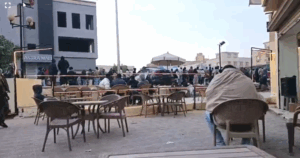Professor accuses Sudan govt of pro-Russia bias in Ukraine conflict
Professor Salaheldin El Doma, a professor of political science at Sudanese universities, condemned the decision of Sudan’s coup authorities to abstain from voting on a resolution that condemns Russia’s invasion of Ukraine in a United Nations General Assembly.
 The Sudanese Naval Forces received a Russian frigate which docked in Port Sudan in March 2021 (SUNA)
The Sudanese Naval Forces received a Russian frigate which docked in Port Sudan in March 2021 (SUNA)
Prof Salaheldin El Doma, a professor of political science at Sudanese universities, condemned the decision of Sudan’s coup authorities to abstain from voting on a resolution that condemns Russia’s invasion of Ukraine in a United Nations (UN) General Assembly.
In an interview with Radio Dabanga, Professor El Doma said that Sudan's abstention from voting on the issue of condemning the Russian invasion of Ukraine is interpreted in international relations as a bias towards the Russian side.
The resolution stipulated the UN “deplores in the strongest terms the aggression by the Russian Federation against Ukraine” and demanded that “the Russian Federation immediately cease its use of force against Ukraine” and “immediately, completely and unconditionally withdraw all of its military forces”.
In the emergency General Assembly session, 141 of the 193 member states voted for the resolution, 35 abstained, and five voted against. The only countries to vote against the resolution, in support of Russia, were Belarus, North Korea, Eritrea, and Syria.
El Doma described the decision to abstain as ‘irresponsible behaviour’ and ‘not in the interest of Sudan’. He explained that the position announced by the Sovereignty Council falls within the same biased framework.
He said that Sudan should have voted in favour of condemnation because the Russian invasion of Ukraine violated international law and Russia had no right to attack a fully sovereign state without any justification.
'Sudan should have voted in favour of condemnation because the Russian invasion of Ukraine violates international law and Russia has no right to attack a fully sovereign state'
The professor also said that the decision is in line with the direction of "the dictatorial power" that has now been set in motion in Khartoum with the October 25 military coup, headed by Sudan Armed Forces (SAF) Commander Lt Gen Abdelfattah El Burhan and Rapid Support Forces (RSF) Commander Mohamed Hamdan ‘Hemeti’ Dagalo.
He explained that these authorities are in a state of continuing conflicts with Western countries and pointed out that a Sudanese delegation headed by Hemeti was in Moscow at the moment of the outbreak of the war.
Russian naval base
El Doma also mocked Hemeti’s statements about a potential Russian naval base in the Red Sea. Hemeti said that Sudan would let Russia, or any other country, open a naval base on the 730-km Red Sea coast, given that it would not threaten Sudan’s national security. Hemeti also said that the file of the Russian base is the responsibility of the Minister of Defence.
An agreement on hosting Russia’s naval base was reached in 2019 with ousted President Omar Al Bashir, which still remains under review. Russian President Vladimir Putin signed an agreement with Sudan in 2020 to set up a naval logistics hub in Sudan.
'Hemeti’s academic capabilities do not allow him to comprehend the meaning and significance of a Russian military base in Sudan'
El Doma explained that Hemeti’s 'academic capabilities' do not allow him to comprehend the meaning and significance of such a military base in Sudan.
He said that the issue of military bases is a strategic issue that falls under the responsibility of the entire state government. He said that no party has the right to make a decision or sign any agreements with other countries in the absence of a legislative authority.











 and then
and then